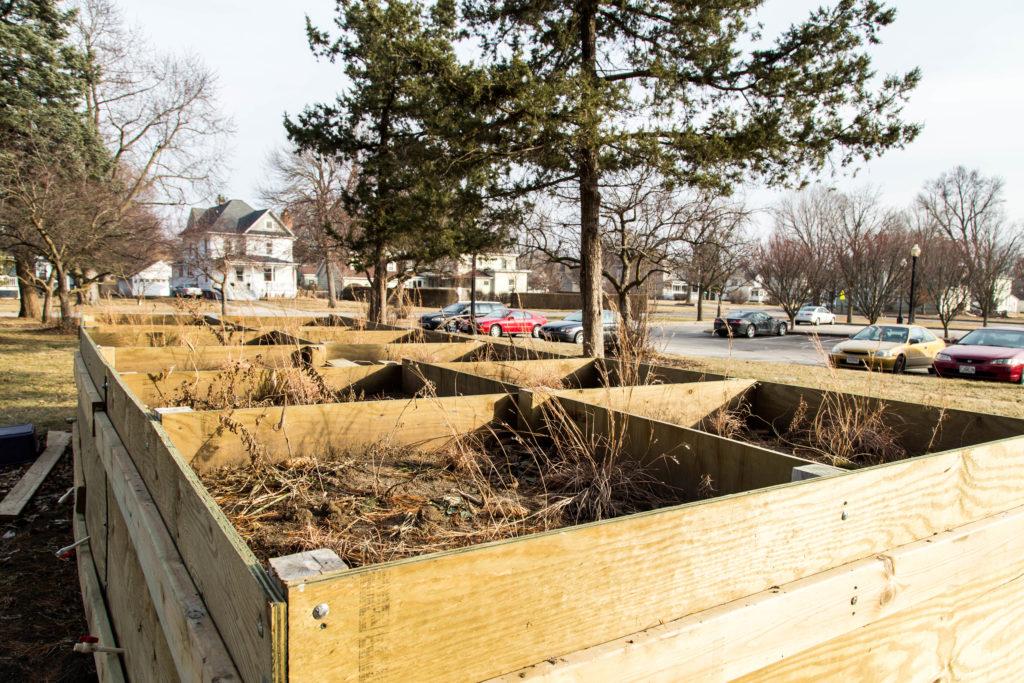After the Innovation Fund rejected his proposal for a college farm, Professor Jon Andelson, anthropology, was deeply disappointed. Now he’s concerned that the small garden he runs will be demolished this summer. Andelson, who is the director of the center for prairie studies, helped set up the garden on Park St. in 2000, and he spearheaded the push to create a farm on campus. Now that the farm proposal is no longer in play, Andelson has turned his attention to the garden, which may have to be relocated to make space for three language houses.
In 2015, Andelson, along with Rabbi Rob Cabelli, associate chaplain, and Real Foods Coordinator Molly Schintler, began to craft a proposal, taking inspiration from other colleges that operate farms to provide hands-on learning and a sense of community. They decided to apply to the Innovation Fund, which was created in 2012 by President Raynard Kington to support innovative proposals to enhance teaching and campus life.
“The Innovation Fund did not fund the proposal [last year], but did give us a grant to do further study. At that time our sense was that they basically liked the idea but thought it was not adequately fleshed out,” Andelson said. “We resubmitted a proposal with more detail.”
With the grant money, Andelson organized trips last summer to visit college farms to learn what elements were essential to success. While the Innovation Fund Committee had questioned the need for a full-time farm manager, Andelson came away from the visits feeling that without one the farm would not meet its full potential.
“It’s strange to me that so many of our peer institutions have farms, some of them only as big as we were proposing, some of them bigger. And they seem to be making them work, and here we are in Iowa, one of the leading agricultural states … we should too,” Andelson said.
In advance of resubmitting their proposal last September, an online petition was created and received 631 messages of support, primarily from students and alumni. Some faculty members gave their backing, imagining uses for the farm in various classes. Additionally, individual students from a wide range of student groups wrote statements supporting the project, and SGA unanimously passed a motion in favor.
“We were talking about incorporating a lot of classes into the farm operation, classes in all three divisions. We were talking about an outdoor classroom space,” Andelson said. “We were going to address social justice issues surrounding the issues of food, and link food justice to social justice more generally.”
However, the Innovation Fund Committee, which is made up of faculty, trustees and a member of the administration, decided in December to fund nine other projects instead of the farm.
“They acknowledged the amount of support the proposal had … I guess one would have to say, obviously, other considerations, in their mind, were more important,” Andelson said.
After learning of the decision, Andelson turned his attention to how the new admissions building would impact the existing garden. The College is building a new admissions and financial aid building on the southwest corner of Park St. and 8th Ave. in an effort to improve the experience for prospective students. The project, which will begin construction this summer, will require relocation of three language houses. Rick Whitney, director of facilities management, informed Andelson that one of the possible relocation sites for the language houses was the location of the garden. However, Whitney deferred to Kington on the matter of where and when to move the garden, if necessary.
According to Whitney, a decision has not been made regarding where the language houses will moved. Andelson is concerned because if the garden must be moved, that process would have to begin within a few weeks for it to be operational this summer.
After sending two emails to Kington, Andelson is still awaiting a reply concerning the garden’s new location.
“We have to move the greenhouse. We have to prepare the soil beds … we have to decide what to plant… we have to order seed. We have to inventory our tools. We have to do a lot of things, all in time for early spring planting which is in April,” Andelson said.
If the dream of a farm is to remain out of reach, Andelson hopes that at least the relocation of the garden could provide an opportunity for expansion.
“What I’m hoping for is an expanded garden. If we can’t have the farm, at least give us the garden.”






















































